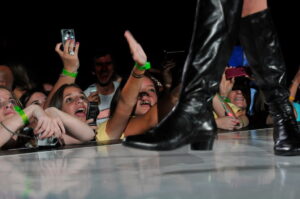by kwheele4 on March 4, 2021
Opinion

Evening the Playing Field: How Supporting Women’s Hobbies Could Impact Their Futures
By Julia McCoy ’22
Do young women have hobbies? It seems like a simple answer would come from this question. Yes, of course they have hobbies, how else would they express their interests? And yet, the issue of women’s hobbies and interests is a legitimate debate across social media platforms like TikTok.
According to one TikTok account, @nofocksgivenpodcast, it is “rare” for young women to have hobbies in the same ways that boys do. The podcast hosts argue that there are no hobbies that bring young women together the same way that some hobbies bring boys together. While this is clearly untrue–and rejected by several women—it does raise an interesting question: why are womens’ hobbies and interests not taken as seriously as boy’s?
One issue that causes this is that sometimes, women’s hobbies can be seen as attention-seeking. If a woman likes sports or video games, she is suddenly expected to know everything about that particular thing. If she doesn’t, then it is assumed that she doesn’t genuinely have an interest, but is just doing it to get the attention of the men around her.
When asked about this, Abigail Pruchnicki ’22 said, “When I throw a football with my friend on campus, I worry that people will see me and think ‘she’s just doing that to impress guys.” This is a common thought both on Providence College’s campus and in other aspects of female lives. Women oftentimes feel like they’re incapable of being able to freely express their interests without people suspecting them of having ulterior motives.
On the other hand, there are interests that are deemed “too feminine,” including makeup or clothing. Women are allowed to have these interests, so to speak, but they are not considered as intellectual or interesting as men’s interests. If a woman has a hobby like makeup, she may be seen as vain or girly. So, although she may not be judged for pretending to like something, she may also be judged because the thing she does like is considered superficial.
By making interests “masculine” or “feminine,” a precedent is set that excludes people from exhibiting what they are passionate about. If a young woman is forced to suppress her interests from an early age, she might lose confidence in other aspects of her life.
Another issue to consider: how is music “girly”? How is a TV show or movie deemed “for girls”? When a large group of women tend to find interest in one artist or show, it is often deemed not as serious as its fellows. This is especially true in the case of boy bands, or teen pop music in general. It seems that just because the majority of an artist’s fanbase is female, they do not deserve the same critical respect as other artists.
Some artists, like Harry Styles or Taylor Swift, have faced this backlash for many years. Oftentimes, their music is brushed aside as appealing to the masses or only for fangirls. In reality, the two artists—and several of their peers with the same issues—have critically acclaimed work.
When asked in Rolling Stone about the issue of being able to prove his credibility due to the large mass of female fans that he has, Styles responded, “Who’s to say that young girls who like pop music—short for popular, right?—have worse musical taste than a 30-year-old hipster guy?” Essentially, why are the interests of young women brushed off as irrelevant fanfare?
He continued, “How can you say young girls don’t get it? They’re our future… they kind of keep the world going.” Thinking of the gravity of this, it can be argued that suppressing the interests of women from an early age may contribute to them becoming less confident in their future pursuits.
Young women are entering into higher education and the workforce at increasing rates. It is incredibly important to make sure that these women are uplifted, rather than put down, from a young age. If their interests are taken seriously and they are able to pursue any hobby they want, they will be more likely to aspire to better things in their careers.
Additionally, if the playing field is evened between women and men relating to their interests from a young age, they will be equally likely to pursue their interests in an uninhibited way.